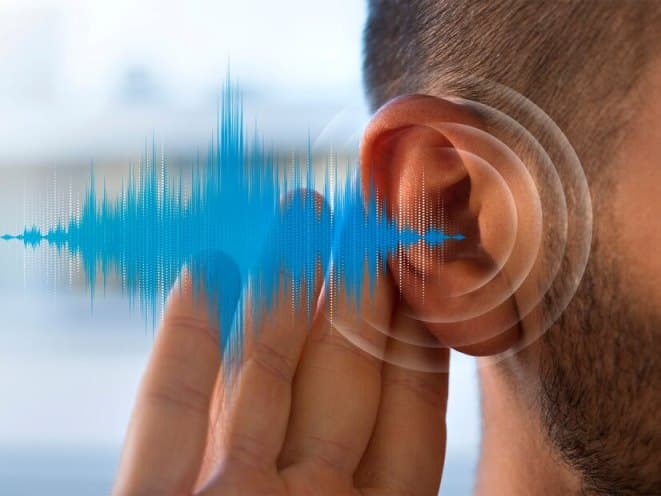Why Do I Hear an Echo in My Ear?
Hearing an echo in your ear can be an unsettling and frustrating experience. This phenomenon, often described as a “hollow” or “reverberating” sound, may occur intermittently or persistently, affecting one or both ears.
Several factors can contribute to this sensation, ranging from simple causes like earwax buildup to more complex issues such as Eustachian tube dysfunction or even hearing disorders.
Finding relief from an echo in your ear begins with understanding why it occurs. This article will discuss the probable reasons of this hearing issue with possible treatment options.
Table of Contents
What is an Echo in the Ear?
An echo in the ear, also known as autophony or distorted hearing, occurs when sounds — especially your own voice — seem to be repeated.
This sensation can feel like hearing sounds in a tunnel, as if your ear is resonating with the noise around you. It may happen in one or both ears and can be temporary or persistent, depending on the underlying cause.
Normally, sound waves travel through the ear canal, vibrate the eardrum, and are processed by the inner ear before being sent to the brain for interpretation. When this process is disrupted due to blockages, pressure imbalances, or structural issues — sound waves may be altered, leading to the perception of an echo.
Echoes in the ear can vary in intensity. Some people notice it only when speaking, while others may experience it with external sounds like music or conversations. Frequent or prolonged instances of echoing may suggest an underlying problem that needs medical attention, even if isolated occurrences might not be reason for alarm.
Important Signs of Ear Echoing
Experiencing an echo in the ear can come with a variety of related symptoms, depending on the underlying cause. Some people may only detect slight reverberation, but others may feel more physical or aural discomfort. The following are the main signs of ear echoing:
- Reverberating or Echoing Sounds: Your own voice or external noises may sound duplicated, hollow, or as if they are bouncing inside your ear.
- Muffled or Distorted Hearing: Sounds may seem unclear, as if they are being filtered or blocked, making it difficult to understand speech.
- Ear Fullness or Pressure: A sensation of blockage, tightness, or congestion in the affected ear, similar to what you feel during air travel or sinus congestion.
- Tinnitus (Ringing or Buzzing in the Ear): Some people may hear a persistent ringing, buzzing, or humming noise along with the echoing sensation.
- Hearing Sensitivity Changes: Sounds may seem unusually loud or amplified, or there may be temporary hearing loss in one or both ears.
- Dizziness or Balance Issues: In some cases, echoing in the ear may be linked to inner ear problems that affect balance, leading to lightheadedness or unsteadiness.
Common Causes of Echo in the Ear
An echo in the ears can result from various factors affecting the ear’s structure, function, or auditory processing. Some causes are temporary and harmless, while others may require medical attention. Below are the most common reasons why you might experience an echo in your ears:
Earwax Buildup
Excess earwax can partially block the ear canal, leading to sound distortion and an echoing effect. This happens because sound waves cannot travel properly, causing them to reflect back inside the ear.
Eustachian Tube Dysfunction
The Eustachian tube connects the middle ear to the back of the throat and helps regulate ear pressure. If it becomes blocked due to allergies, sinus infections, or colds, sound waves may not be transmitted correctly, leading to an echo.
Middle Ear Infections (Otitis Media)
Infections in the middle ear cause fluid buildup behind the eardrum, which can interfere with normal sound transmission and create an echoing or muffled sensation.
Inner Ear Conditions
Disorders such as Ménière’s disease or cochlear damage can alter how the inner ear processes sound, leading to auditory distortions, including echoes.
Hearing Aid or Sound Amplification Issues
If you use hearing aids, improper settings or feedback can cause sounds to be amplified unevenly, creating an echo effect. Similarly, being in a room with strong sound reflections can make echoes more noticeable.
Structural Issues in the Ear
Abnormalities such as a perforated eardrum, ossicle dysfunction, or otosclerosis (stiffening of the ear bones) can impact sound transmission and cause echoes.
Neurological or Auditory Processing Disorders
In rare cases, conditions affecting the auditory nerve or brain, such as auditory processing disorders or multiple sclerosis, may cause sounds to be misinterpreted, leading to an echoing sensation.
Barotrauma (Pressure Changes)
Rapid altitude changes, such as during flights, scuba diving, or driving through mountains, can affect ear pressure and create a temporary echo effect.
Temporal Bone Issues
The temporal bone of the skull houses the ear canal, the cochlea, and other important structures. Any disruption or abnormality in this area, such as fractures or tumors, may affect hearing and result in an echo sensation. These cases are rare but can be associated with trauma or other serious health concerns.
TMJ (Temporomandibular Joint) Disorders
The temporomandibular joint, located near the ear, connects the jawbone to the skull. Disorders of this joint, which may result from teeth grinding, jaw clenching, or misalignment, can cause a variety of auditory symptoms, including echoing sounds. In these cases, the echo may be due to pressure changes in the ear or the joint’s impact on the surrounding tissues.
How to Get Rid of Echo Sound in the Ear
Treatment for ear echoing depends on the underlying cause. In most cases, the condition is temporary and resolves on its own. However, when symptoms persist or are accompanied by other warning signs, medical intervention may be necessary. The following are practical strategies to reduce or eliminate the echo sound in your ear:
Remove Excess Earwax
If earwax buildup is causing the echo, try using over-the-counter ear drops to soften the wax. You can also flush the ear gently with warm water or use an ear irrigation kit. However, avoid inserting cotton swabs, as they can push wax deeper into the ear canal.
Relieve Eustachian Tube Blockage
If the echo is due to Eustachian tube dysfunction, try the following methods to open the tubes:
- Yawning, swallowing, or chewing gum to encourage natural ear pressure regulation.
- The Valsalva maneuver: Pinch your nose, close your mouth, and gently blow to equalize ear pressure.
- Steam inhalation or a warm compress to reduce nasal congestion and promote drainage.
Treat Ear Infections
If an ear infection is causing the echo, symptoms may improve with rest, hydration, and over-the-counter pain relievers like ibuprofen or acetaminophen. If the infection persists, worsens, or is accompanied by fever, a doctor may prescribe antibiotics or other medications.
Adjust Hearing Aids or Audio Devices
If you use hearing aids and experience echoing, check their settings or consult an audiologist for adjustments. Sometimes, improper fitting or sound feedback can create an echo effect.
Manage Sinus Congestion and Allergies
If allergies or sinus congestion are contributing to the problem, consider:
- Taking antihistamines or decongestants to reduce swelling in the nasal passages.
- Using a saline nasal spray to clear mucus buildup.
- Drinking plenty of fluids to thin mucus and promote drainage.
Allow Pressure Changes to Stabilize
If the echo occurs due to altitude or barometric pressure changes (such as during flights or scuba diving), try yawning, swallowing, or using the Valsalva maneuver to help equalize pressure.
Managing TMJ Disorders
If TMJ is the cause, treatment may involve:
- Physical therapy to relax jaw muscles
- Mouthguards to prevent teeth grinding
- Pain management techniques, such as heat or cold compresses.
Tinnitus Treatment
For those with tinnitus, treatments may include:
- Sound therapy or white noise machines to mask ringing
- Cognitive behavioral therapy (CBT) to reduce anxiety related to tinnitus
- Medications to manage symptoms or underlying conditions.
Home Remedies for Echo in Ear
If you are experiencing an echo in your ear, several home remedies can help relieve the condition. Here are some simple and effective methods to try:
Warm Compress
Applying a warm compress to the affected ear can help relieve pressure, reduce inflammation, and promote fluid drainage.
- Soak a clean cloth in warm water, wring out excess water, and place it over the ear for 5–10 minutes.
- Repeat as needed throughout the day.
Steam Inhalation
If sinus congestion or a blocked Eustachian tube is causing the echo, inhaling steam can help clear mucus and open up the airways.
- Boil water and pour it into a bowl.
- Lean over the bowl, cover your head with a towel, and inhale the steam for 10–15 minutes.
- Adding essential oils like eucalyptus or peppermint can enhance the effect.
Chewing Gum or Swallowing
Chewing gum, sucking on candy, or swallowing repeatedly can help open the Eustachian tube and relieve pressure-related echoing. This is especially helpful if the echo is caused by altitude changes or mild congestion.
Olive Oil for Earwax Removal
If excessive earwax is causing the echo, olive oil can help soften it for easier removal.
- Warm a few drops of olive oil and place them in the affected ear using a dropper.
- Let it sit for 5–10 minutes, then tilt your head to drain.
- Repeat once or twice a day for a few days until the blockage clears.
Saline Nasal Spray or Neti Pot
Clearing nasal congestion can help reduce ear echoing caused by sinus pressure.
- Use a saline nasal spray to moisten and clear nasal passages.
- A neti pot can also flush out mucus and allergens from the sinuses.
Rest and Avoid Loud Noises
Sometimes, ear echoing can result from temporary irritation or exposure to loud noises. Resting in a quiet environment and avoiding loud music or headphones can help the ears recover.
Conclusion
Experiencing an echo in your ear can be bothersome, but in most cases, it is temporary and treatable. If the echo persists, worsens, or is accompanied by symptoms such as pain, dizziness, or hearing loss, it may indicate an underlying medical condition that requires professional evaluation.
You may take the appropriate actions toward alleviation and improved ear health by being aware of the possible reasons and knowing when to get medical help. If your symptoms do not improve, consulting a healthcare provider can help identify the issue and provide the appropriate treatment.


